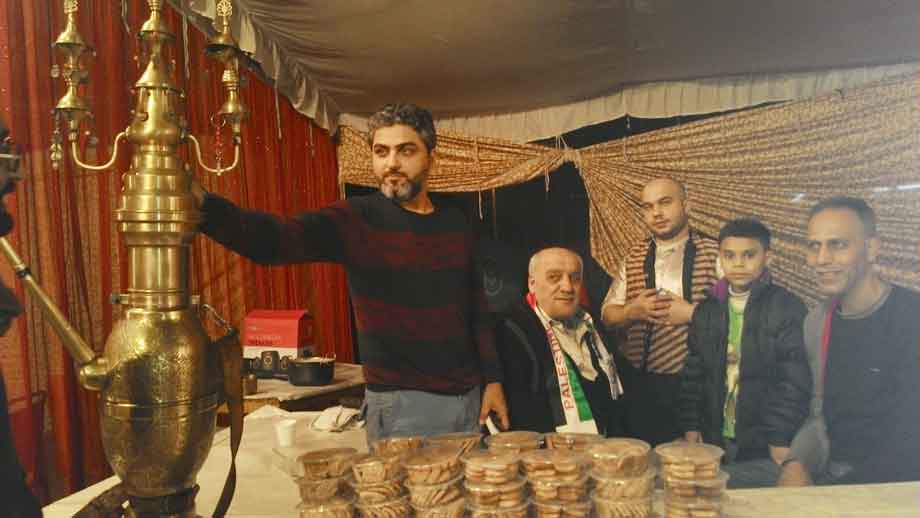The Politics of Food: Palestinians Exhibit Culture, Identity At JNU Food Festival
By Abhay Kumar
03 March, 2014
Countercurrents.org

As the dusk of Republic Day fell and dazzling lights began to flood the Jhelum Lawn of Jawaharlal Nehru University (JNU), hundreds of students thronged International Food Festival. I, too, joined the crowd and walked along one stall after another, looking at mouthwatering cuisines. But later the evening, before I came out of the festival’s marquee, I had felt that the venue displayed not only foods but also aspiration, identity, struggle and culture of a subjugated people.
One of the participants in the annual festival was Palestine. As the illegal Israeli occupation continues, the festival served as an important space for Palestinians to assert their identity.
‘The foods we are serving carry our national culture,’ said Ibrahim Abu Ghali, standing with his friends in the Palestinian stall. Ibrahim is from Gaza and currently pursuing his PhD (Computer Science) in JNU.
Despite being the only Palestinian student in JNU, he decided to set up the Palestinian stall in the festival. In this endeavour, he was assisted by his Palestinian friends, living in New Delhi, as well as the Palestinian Embassy.
Among his friends present in the stall was Safa, a young Palestinian woman, who teaches Arabic at an Iraqi school in Green Park, Delhi. When asked about her experience of the festival, she smilingly replied, ‘Very nice. Indians are nice people.’
Like Safa, Palestinians see Indians as their friends. Historically, India and Palestine shared a close ties. For example, Gandhi was a staunch supporter of the cause of Palestine, opposing Zionism for its linkage with British colonialism.
But today the message of Gandhi is largely forgotten by the Indian ruling classes, whose name they use to justify their rule, as India’s foreign policy has unabashedly embraced a pro-USA and Israel line in the recent past.
What do you have to say about Indian government’s silence on Palestinian and its strategic alliance with Israel? I asked Safa but she was not forthcoming to speak of political issues. ‘No problem you are free to like any country.’
Sitting close to us and overhearing our conversation was Ibrahim, who suddenly chipped in. ‘I will answer your question.’
As Safa was leaving the venue, I began my conversation with Ibrahim about his experience with visitors. He told me that many people came to the stall, who not only tasted foods but also touched Palestinian national flag, as a gesture of love.
As some new visitors hurriedly came in, Ibrahim turned away from me and began to chat with them. The visitors were inquiring about Palestinian cuisines.
Finding myself alone, I now turned to a nine-year old boy, Yasir, who was standing in the stall. Yasir did not remember anything about his home in Palestine as he has been living with his ‘refugee’ father for last four years in Kishanganj, Delhi. How is the festival, I asked? His reply, too, was not different from that of Safa. ‘The party is beautiful. People are good.’
For Yasir and me, it was difficult to continue with the conversation due to language barrier. Thus, I had to turn to Ibrahim again. In this spell, our conversation was mostly around Palestinian foods. Ibrahim pointed to maqluba, which is like biryani, made of rice, cauliflower, brinjal etc. But more importantly, Palestinian food falafel was also displayed and served, presumably as a mark of asserting Palestinian culture.
Falafel, a deep-fried ball or patty made of beans, fava, and ground chickpeas, has been at the centre of a controversy for long time. For instance, Israel has tried to appropriate falafel, a move which is strongly opposed by Palestinians. In contrast, having falafel at Palestinian stall seemed to aim at questioning this very appropriation.
As I was amazed to see their spirit to fight, I could not help asking Ibrahim what made them so committed. ‘We have no independent country, nor do we have right to citizenship. Israel is a powerful nuclear country. We have no option but to fight it,’ Ibrahim asserted.
(Abhay Kumar is pursuing PhD at Centre for Historical Studies, Jawaharlal Nehru University, New Delhi. He can be contacted at [email protected])
.
Comments are moderated

